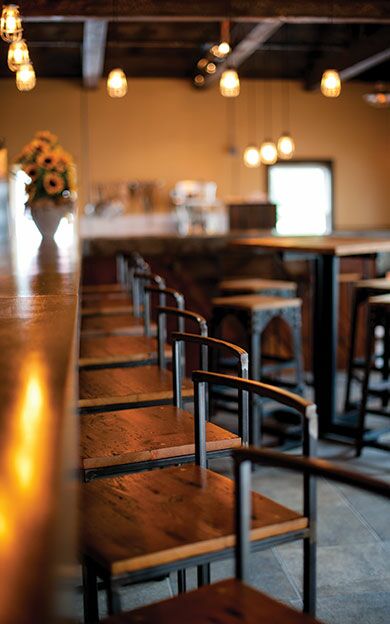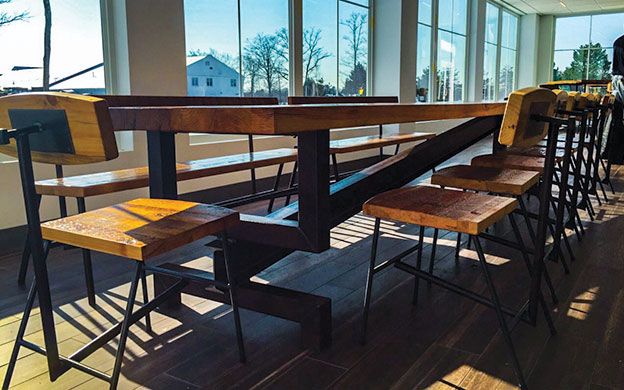Reclaimed materials for an iconic look: Furniture from Artas Designs brings the outdoors inside
Artas Designs may not be a household name. But in the five years since the Biddeford firm started making furniture and fixtures from reclaimed materials, it has become a go-to designer for retailers and restaurateurs aspiring to create a rustic, iconic New England aesthetic.
In their workshop, hardware from a World War II aircraft hangar is transformed into shelving for a restaurant bar in Portsmouth, N.H. Floor joists and a structural I-beam from a shuttered textile mill are made into chairs and benches for a corporate headquarters. Wood from a barn that once housed cattle in a farm in northern Maine becomes a table top for a restaurant in Massachusetts.
Artas has built a reputation that has made advertising unnecessary and a roster of clients that includes some of the most well-known New England-grown brands. To name a few: L.L.Bean, Coffee by Design, Luke's Lobster, Allagash Brewing Co., Flatbread Co., Portland Food Co-Op, Not Your Average Joe's, Life is Good, Pet Life Stores, Timberland.
Tadas Mikuzis and Art Timofejev, the founders of Artas Designs, were born and raised in Klaipeda, Lithuania. Enchanted by Maine's natural beauty and the people they met here, they moved here in 2001. They began working with friends who were running Gorham-based Utopia Designs, transforming wood, steel and other salvaged materials from old aircraft hangars and century-old barns into furniture and fixtures.
Though the pair had never done this work before, and the concept of using recycled materials was completely foreign, they quickly fell in love with it.
“I found that building furniture and putting my hands on materials and coming up with new designs was what I wanted to do,” says Timofejev. Though he trained as a civil engineer, “I didn't want to spend my days in front of a drafting board.”
And as the economy emerged from the recession, demand for eco-friendly furnishings was growing.
The use of reused or salvaged building materials can help builders earn credits for the highly-coveted LEED certification. In 2014, an all-time high of 675.9 million square feet of real estate space became LEED certified, according to the U.S. Green Building Council, a Washington D.C.-based trade group. That was a 13.2% increase over the previous year.
Sales of green building materials, which reached $51.8 billion in 2012, are expected to climb 11% each year to $86.6 billion by 2017, and $113.5 billion by 2022, according to The Freedonia Group, Inc., a Cleveland-based consultancy.
“In addition to the lift supplied by general construction activity,” Freedonia Group analyst Matt Zielenski wrote in a report, “continuing consumer interest in environmentally friendly products will increase the market share of most green building materials relative to non-green alternatives.”
Turning barns into seating for pizza shops
In 2010, Mikuzis and Timofejev formed Artas Designs. They leased a 5,500 square foot space in Biddeford's Lincoln Street Mill and hired two employees. Their first job was to build booths, tables, and chairs for the Flatbread Co. pizza shop in Somerville, Mass., which was being housed in a former bowling alley.
Soon afterwards, their work was featured in the September/October 2011 issue of Design New England magazine. As soon as it was published, they started getting calls from buyers from all over North America.
“People like the fact that these materials are not ending up in a landfill, and they're getting a nice piece of furnishing in their bars and restaurants,” says Mikuzis, who trained as an electrical engineer. “People really value the fact that there is a history behind the materials, that they might have something in their home or store that's from a 120-year-old barn in Cape Elizabeth.”
The business — which is about 10% residential and 90% commercial—has grown mostly by word-of-mouth ever since. They now have a staff of eight, have tripled the size of their space and recently bought their own building. Though they won't disclose revenues, they say they have been steadily growing at about 15% per year.
Their work caught the eye of John Soule, retail store visual merchandising designer for L.L.Bean. Soule tapped Artas to build shelves, counters and display cases for some of the most highly-trafficked areas of the company's flagship store in Freeport as well as in some stores outside of Maine.
At the Freeport store, Artas' work includes chairs, various shoe and clothing racks, directional signs, displays that showcase L.L.Bean's original pair of hunting shoes and furniture made from reclaimed barn board in the 1912 Cafe and Coffee by Design.
“Artas delivers a high quality product using honest and simple materials,” says Soule. “Their work demonstrates integrity, great design sense, resourcefulness and a clear focus on being a good business partner. We love to work with Maine companies when we are able. And we love even more when they share our environmentally friendly ideals. Using a local company affords the benefit of collaborating face to face, and our store design is better for it.”
The more exposure Artas got, the more referrals flowed in. Thanks to word of mouth, they haven't had to invest in time-consuming marketing that would have taken them away from making furniture.
After seeing their work around Biddeford, Bryan Holden reached out to Artas when he was searching for chairs to fit to the Luke's Lobster chain of restaurants he was opening in New York, New Jersey, Boston, Chicago and Washington, D.C.
“When a customer walks in, we want them to feel like they're coming into a lobster shack on the coast of Maine,” says Holden, who co-owns the business with his brother Luke. “Their use of reclaimed barn board for seats and carbon steel for framing added a nice complement to what we are doing. And they were just so easy to work with.”
David Libby, president and CEO of Town and Country Federal Credit Union, discovered Artas Designs last fall, when TCFCU was working with Portland Food Co-Op (another Artas client), as it ramped up to its grand opening.
“I was just blown away by their creativity,” says Libby. For the credit union's new 20,000-square-foot administrative offices, which opened in December, Libby hired Artas to design a 14-foot communal table made from floor joists from an old textile mill and reclaimed structural I-beam and square tubing. Artas designed chairs and benches made out of reclaimed barn board, bar-height cafe tables and shoe cubbies, as well as a special wall to display recognition awards.
“We wanted our space to have that connectivity to the outdoors,” says Libby. “We liked the synergy that these earthy elements of reclaimed wood and metal created with our open, flexible office space.”
What's more, it fit into the company's sustainability goals for the new facility. Though the new headquarters isn't LEED certified, it is built using eco-friendly materials and building practices.
“We wanted to have sustainable, low-impact building,” he says.
Improved economy driving business
While plenty of other craftsmen are making furniture from reclaimed materials, Mikuzis and Timofejev say they're not feeling competitive pressure. Demand keeps growing, plus clients are now ordering with longer lead times, which they interpret as a sign of confidence in the long-term health of the economy.
“This stuff is so popular now,” says Timofejev. “And with the economy getting better, it feels like there is plenty of business for everyone.”
But they do grapple with the same frustrations that so many other small businesses do. Energy costs are high; they have to maintain a temperature of about 65 degrees in order for the glue to dry, and that can mean spending in excess of $1,700 a month just for heating.
What's more, attracting and retaining a workforce is a challenge, especially as they hope to double the size of their staff in the years ahead.
Even new hires who have experience in woodworking need up to six months of training to learn the nuances of working with reclaimed materials. An errant nail stuck in the wood can ruin an expensive piece of machinery; it takes extra time to apply finishes because the wood is so dry.
“You can't learn it from a textbook,” says Timofejev. “You have to put your hands on it and try it about a trillion times.”
And they work hard to keep a pleasant and safe working environment for those they do hire. The two founders work side by side with employees on the production line, whenever they're not meeting with clients or handling back-office work.
“They feel that and they respect that,” says Mikuzis.“We don't have a layer of management. ”
They must carefully calculate how much work to take on, so they have enough of a buffer if a part doesn't arrive on time, a lasering job that they outsourced falls through, or half the staff is out with the flu.
“You're always balancing how much work can you take in, and still keep the employees and the clients happy,” says Mikuzis. In a business as theirs, that has grown almost entirely on its sterling reputation, that's especially important.
“If the client is not happy,” he adds, “they're not going to go with you again, and then you have to scramble for work. And that creates more troubles.”













Comments